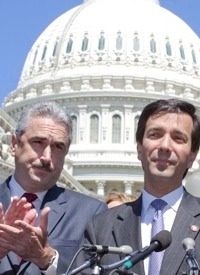
The United States’ unemployment rate remains high at 9.7 percent. States are in the unfair position of having to take immigration law into their own hands. Americans are angry about the overspending in D.C., increased taxes, an aggressive health care bill, and proposals for “cap and trade.” But despite all of these looming issues, what legislation does Congress plan to tackle today, April 29? H.R. 2499 (Puerto Rico Democracy Act of 2009), a piece of legislation that may allow Puerto Rico to become a state.
The bill requires Puerto Rico to hold an election on a referendum that reads, “Do you want to maintain the status quo?” Now, if it seems strange that a bill related to potentially adding a 51st state to our union does not once mention the word “statehood,” it should.
The referendum is purposely written this way to bring about a desired result. Legislators know what the answer would be if Puerto Rican voters are asked to vote on statehood, since in the past 40 years, Puerto Ricans have eagerly voted against becoming a state three times. The most recent vote took place in 1998, when voters were provided with the following four choices: a.) statehood; b.) sovereignty; c.) modified commonwealth; d.) none of the above. Of the choices, the response was overwhelmingly choice “D.”
As reported by The John Birch Society, “[Puerto Rico] enjoys their commonwealth status, which allows them to enjoy the protection and freedoms and even financial benefits of the United States without paying federal income taxes.”
But if voters are asked whether they want to maintain the “status quo,” a loaded and misleading question, that might just change their answer. Glenn Beck says, “Do YOU want to maintain the status quo of OUR country right now? Nope. If Bertha Lewis, who, you know, runs ACORN, if she were watching, I can guarantee you if I said: ‘Hey, Bertha, do you want to maintain our current status? Maintain the status quo?’ I guarantee Bertha Lewis would say ‘hell, no!’ See the trick?”
Yes we do, but no thanks to the mainstream media, who has barely covered this bill in between rants about “Tea Party violence.” As it turns out, if Puerto Ricans vote “no” on the referendum, the next step involves a second vote between whether Puerto Ricans wish to acquire statehood or full independence. Not a tough choice there!
Even if the referendum happens to turn out a majority of “yeses," indicating satisfaction with the “status quo,” The John Birch Society notes: “Every eight years henceforth from the passage of HR 2499, Puerto Rico is forced to conduct another plebiscite on the matter at their own expense.”
Why, among all things, is Puerto Rico’s statehood being addressed on this day? According to Right Pundits, “The current drive is being pushed by the Democrats to placate the Latino voters." In light of the recent protests from the Hispanic communities regarding Arizona’s immigration law, this may be one intention.
Beck raises further motives: “It’s all about bringing more people on board, more people who can vote for the Democratic Party. It’s a four-step process to ensure they will essentially be one party for the next century. Democrats want 12 million illegal aliens to vote… they want to help convicted felons… they tried to grant the statehood of the District of Columbia…”
And now, they want to add Puerto Rico to the union for the Hispanic votes.
Sadly, support for this proposal is not limited to the Democrats. Republicans claim that this is a vote for freedom, for democracy. Really? Are you sure its not about big government? Global government?
The politicians assert that this is a “non-binding” vote. However, if Puerto Rico votes “No” on the referendum, they are then required to elect six representatives and two senators. Thanks to the “Tennessee plan,” this might negate the need for a second vote. Tennessee and Alaska were able to enter the union without voting for statehood because their elected officials demanded to be seated in Washington, D.C., and were. So when the congressmen insist that this vote is “non-binding,” either they don’t know their history, or don’t care to be honest with the public.
The adoption of Puerto Rico as a 51st state would have major repercussions. First, because of the 435-seat cap in the House of Representatives, existing states may be required to give up a representative to Puerto Rico. Second, the addition of an almost completely Spanish speaking state would inherently make America a bilingual country. Finally, the adoption of Puerto Rico necessitates the absorption of Puerto Rico’s financial struggles, for which this country is ill-prepared.
If you feel strongly in opposition to this bill, contact your representative and senators to make your voice heard. Thomas Jefferson said it best when he said, “All tyranny needs to gain a foothold is for people of good conscience to remain silent.”
Photo: Puerto Rico Senate President Thomas Rivera Chatz and Gov. Luis Fortuno at a news conference on Capitol Hill where they spoke in support of H.R. 2499: AP Images




